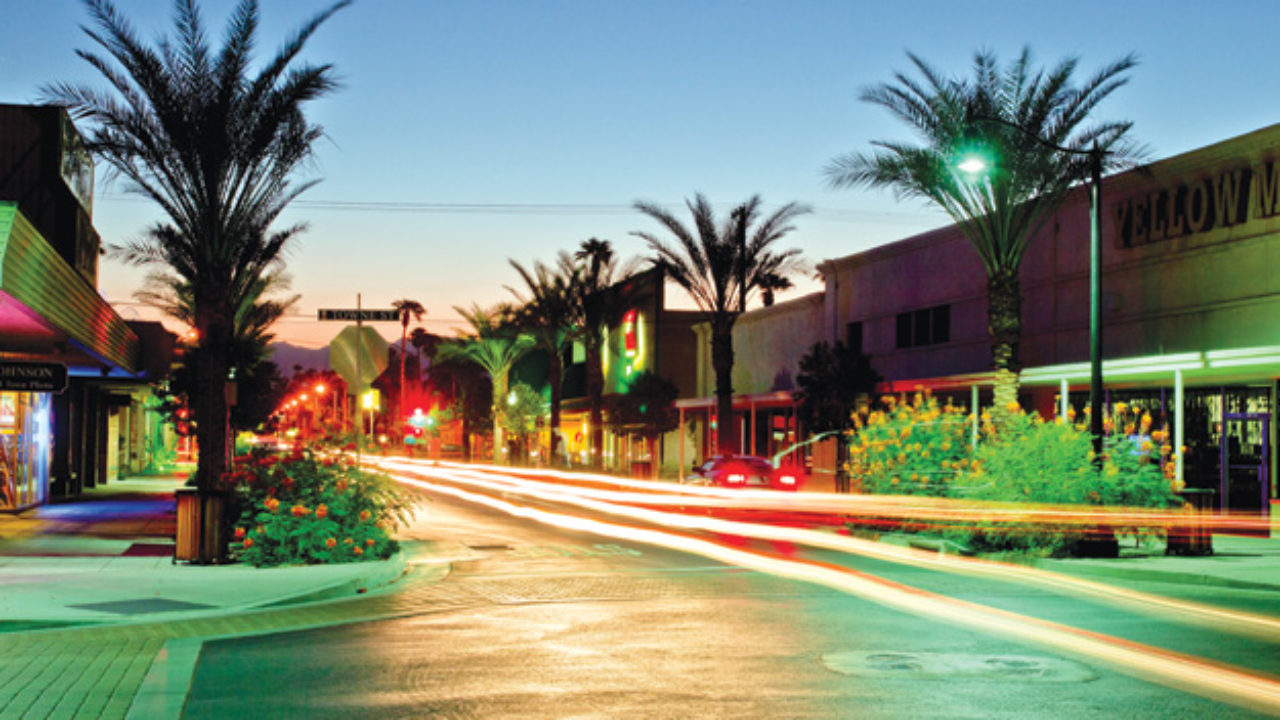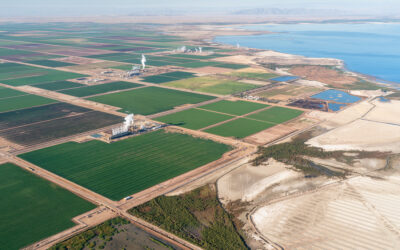Downtown Indio is poised for new development, including COD campus expansion
Mayors and other leaders from across the desert region took the opportunity during the Greater Coachella Valley Chamber of Commerce Annual Mayor and Tribal Chair Town Hall to present some exciting things underway and in the pipeline, to hype upcoming events and to highlight the importance of regional cooperation to their shared success.
Following prepared remarks, they also addressed questions posed by the moderators that focused on a variety of core business and economic themes.
Improving Broadband in the Region
Riverside County Fourth District Supervisor V. Manuel Perez referred to a photo – which went viral nationwide – of two young students in Northern California sitting in a Taco Bell parking lot with their laptops, trying to get their schoolwork done by using the restaurant’s WiFi. “We already knew that broadband was an issue throughout California, including here in both the east and west ends of the Valley, but the onset of the pandemic highlighted how important it is that we get the resources necessary to provide access to the unserved and improve the service level for the underserved.”
“I am happy that $6 billion has been allocated in California over the next three years for broadband efforts but we have to stay on top of this to make sure we can make the funding happen for us here,” Perez added.
“Broadband is critically important to us, and so two years ago in Indio the City Council funded a broadband master plan and that is full speed ahead again after being slowed down due to the pandemic,” said Indio Mayor Elaine Holmes. “Certainly, for our students and educational system it’s critical, but also from a business standpoint it’s especially critical. We often talk about things like this from a regional perspective, and broadband is certainly something we must have for an even better Coachella Valley economy. We need to work and strive for it and it’s something the City of Indio is pursuing.”
Steven Hernandez praised Desert Hot Springs Mayor Scott Matas for his efforts when he was chairman of the CVAG Transportation Commission to seize an opportunity to install the highest capacity fiber optic cable where upgrades are needed throughout much the region as an add on to a traffic signal synchronization project being managed by CVAG. “We’re going to be taking advantage of the opportunity available because of the $20 million project to build on the fiber infrastructure throughout the Valley, and every city and the county have signed on to participate,” said Hernandez. “So, we’re looking at how to capture the moment today with this and other opportunities to secure funding to bring comprehensive broadband to the region.”
Supporting Businesses During and After COVID
Several of the participants talked about the major impacts the pandemic had on businesses in their respective cities and Riverside County as a whole.
Supervisor Perez highlighted the excellent work done by a collaboration of county economic development staff, representatives from Visit Greater Palm Springs (formerly Greater Palm Springs CVB), Greater Coachella Valley Chamber of Commerce (GCVCC), CVEP and others who formed the Coachella Valley Economic Recovery Task Force. “I appreciate what these folks did, working along with the County of Riverside, to help make sure that people were able to access PPE, understand the process to apply for the PPP grants and many other grant programs and support services that became available,” Perez said.
“Indio is about to roll out Phase 2 of our grant program, which are usually $5,000 and $10,000 grants,” said Indio Mayor Elaine Holmes. “Whether it’s through marketing, grants or other means, we are doing everything we can to support small businesses because they are the heart of all our communities.”
After thanking his city staff and colleagues among the Coachella City Council for their hard work during the pandemic, Coachella Mayor Steven Hernandez pointed to what the city is focusing on to bolster the city’s economy. “For us now, it’s about what’s next. Much of our focus for moving forward is on helping develop the local workforce because finding qualified employees is very hard, especially right now,” said Hernandez. “So, we want to make sure we can support the business community by helping train the people you need to hire, and by emphasizing innovation in our economy. We’ll be rolling out some new things in the next couple weeks.”
College of the Desert
A question on education yielded a number of comments about planned College of the Desert expansion throughout the valley, highlighting both the value and the promise of higher education and making us think about the important role business plays in shaping the future of education and opportunity for local residents.
Indio Mayor Elaine Holmes shared news of the $56 million second phase College of the Desert Indio Campus expansion, noting that the first phase was at capacity the day it opened in 2014. “Now we have the second phase of the campus ready to break ground for another 4,000 students,” Mayor Holmes said.
Cathedral City Mayor Raymond Gregory highlighted the importance of partnerships with local industry. “An example of that is College of the Desert’s project to put their automotive technology center in Cathedral City, right at the auto center so that there will be a connection with the actual employers and jobs in the automotive industry,” he said.
Others talked about the competition for scarce resources that can sometimes make regional cooperation more complicated.
“We haven’t had our fair share of resources in the region,” Palm Springs Mayor Christy Holstege explained. “We’ve been underserved and overlooked by the state and that has led us to sometimes fight over scraps. We need to work together to fight for more resources for all of us.” Others also weighed in on that issue, including Supervisor Perez and Coachella Mayor Steven Hernandez.
“We can all do things as a community and as cities to elevate education in our region,” Mayor Hernandez stated. “The more we can educate our kids, the more we can give them good training, the more opportunity they’ll have. We’ve been working on a partnership with our law school and College of the Desert to get a feeder program. And I’m going to continue to fight for these opportunities for our kids.”
Supervisor Perez echoed the need for more resources. “We know that Palm Springs is in line to be next, so we need to respect that,” he said. “At the same time, let’s make sure that the funding we do have supports expansion throughout the Coachella Valley.”
There are precious few resources go around and overwhelming demands for more and better everything from both government and education – and business. Our view is that the voices from the third leg of the stool could certainly be louder and more active in this conversation.
We applaud the early work of CVEP, One Future, COD, the K-12 systems and others in forming and growing the scope of local industry councils and supporting the expansion of career academies throughout the valley. College of the Desert has also taken important steps to bring business leaders and other community members into their planning and partnerships for expansion.
We believe the opportunity exists for both government and education to be working even more closely with business and industry to create and expand programs, pathways and pipelines aligned with future economic opportunities, workforce needs and local community priorities.
For example, it makes perfect sense to build and expand programs in the West Valley around areas where there are opportunities for alignment and partnerships, including destination education, tourism and architecture, digital arts and media/film, hospitality/culinary, automotive technology, healthcare and clean energy. These are all elements included in the plan COD has announced for the Palm Springs Campus.
Creating strong programs based in one area and replicating them in other areas when and if opportunities exist will allow for the uniqueness of each community to shine at the same time education, business and economy thrive.
Leadership from GCVCC and others can and should continue to help activate movement in that direction, including support to add partnerships and additional resources to the table. Until then, COD expansion plans should move full steam ahead, building partnerships and programs wherever there is opportunity, energy and enthusiasm and the resources to help make it happen. Education is economic development.




